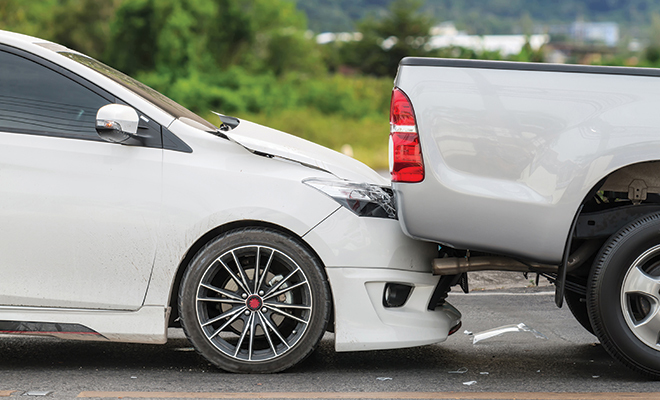
You’ve Had a Car Accident–What’s Next?
It was a left turn that had a profound impact on my life. Heading to a meeting with plenty of time to spare, I noted the green arrow in my lane and made a slow turn into the street. Suddenly, a car came at me at an alarming rate of speed. Immediately, I knew he would hit me.
Ididn’t even have time to hit the brakes. My SUV was totaled by a driver who ran a red light. I was stuck in my vehicle, and an eyewitness stayed with me until my husband arrived. They hauled me via ambulance to the emergency room, with potential broken bones in my legs and ankles. My knee had made horrific contact with the steering column, and my right foot had dragged across the floorboard. While my ER visit and X-rays revealed no broken bones, I was bedridden for three days, unable to walk. My back and neck were strained; medication was needed to deaden the pain. Weeks of therapy followed.
The eyewitness asserted that the other driver ran a red light. The police report placed the blame clearly on his shoulders. Even with this evidence, the other driver’s insurance refused any type of payment. A form letter sent to me stated the accident was my fault, an unethical delay tactic designed to discouraged me and hopefully make me go away. My insurance company took the other to subrogation and won, and I was forced to sue the other driver for medical claims.
Many accidents aren’t this severe and result in minor fender benders or minimal injuries. But no matter the outcome, it’s imperative you gather vital details to ensure proper protection. After an accident, you should notify the police immediately so that a report can be made. I was in no shape to call, but some Good Samaritans did that for me and the other driver. One stayed with me until my hubby arrived and then offered an eyewitness account.
So maybe you weren’t watching as closely as you should and tapped the car in front of you. When it comes time to talk to the police officer at the scene, do not accept fault. Tell what happened from your point of view. And for heaven’s sake, don’t let your emotions get the best of you. Stay calm, watch your language and don’t yell or place blame on the other driver. The officer can be negatively influenced by your bad behavior. Remain cool and share your story. Also, don’t guess what was influencing the actions of the other driver. Simply state the facts.
Do not discuss your accident with anyone but the police and your insurance agent. Sometimes drivers lose their cool, become abusive or try to intimidate you. Don’t engage them. If possible, stay in your car. You may need another call to the police if you believe you’re in danger.
If you’re able, exchange information with the other driver such as name, address, phone number, vehicle, license plate, vehicle owner’s name, his or her address and contact information, insurance company, agent’s name and contact number. Get the policy number, location of damage on the vehicles and any passenger names. Are there injured people? Get their names and contact information as well.
If you have witnesses, get their contact information. Write down the details of the accident and sketch it out, if necessary. Know the streets you were driving on and the direction you and the other driver were traveling. Note any traffic signal lights. My insurance company offers a printed template to follow to ensure vital information is captured; I have mine in my glove box. At my accident, I was a blubbering mess so I relied on the police officer who prepared a solid report with all of the details.
Use your phone to snap pictures of the damage to both cars, the roadway and any traffic signals, the other driver’s insurance cards and license plate. As soon as you’re able, write your notes down so you’ll be prepared when it comes time to give statements to the insurance companies.
Finally, if you witness an accident and it’s safe to do so, offer assistance to the drivers and work with the police to share what you saw. My eyewitness was a game changer for me, given that the other driver claimed I was at fault. “He said, she said” incidents are tough to prove, unless you have witnesses.
And get a dash cam. I did for both of our cars.
After nearly a year, we finally settled for my medical expenses and my totaled vehicle. But I was forced to immediately purchase a new car that wasn’t in the budget. This is a great case for having an emergency savings account at the ready. Thanks to good financial planning and solid insurance coverage, I motored through a left turn that forever changed my life. ■
Sources: statefarm.com and the experience of the author.




